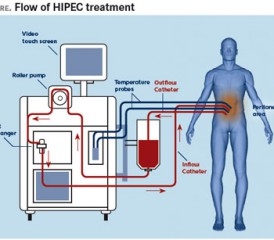Mesothelioma Survivor Praises the Benefits of Heated Chemotherapy

Fact Checked | Written by: Tim Povtak | Last Update: 10/24/2024 | 4 Min Read
Mesothelioma survivor Jacob H. has nothing to gain by touting the benefits of Hyperthermic Intraperitoneal Chemotherapy (HIPEC).
He just believes in it. And he believes in helping others.
He is pretty good proof, too, of what it can do.
Although not all cancer centers in America are using heated chemotherapy, its merits still are being debated Jacob believes that any newly diagnosed patient with peritoneal mesothelioma should find one that does, along with a doctor who understands its importance.
“I would do it again, without hesitation,” said Jacob, 60, who was diagnosed with mesothelioma in 2010. His last name is being withheld over privacy concerns. “Everyone is different, and nothing is 100 percent certain, but I have to believe that the clean checkups I’ve been getting have a lot to do with the HIPEC.”
Jacob has been cancer-free since his cytoreductive surgery and accompanying HIPEC treatment, which involves pumping a heated chemotherapy solution into the abdominal cavity, allowing it to circulate for two hours, then draining it before the patient leaves the operating room.
It also has been referred to as a “heated, chemo bath.”
It is being used today for a variety of abdominal cancers. The theory is that after the surgeon removes all the visible signs of the cancer, the HIPEC can reach cancer cells left behind that might have been out of sight.
During Jacob’s six-hour surgery, doctors removed his peritoneal lining, spleen and appendix, along with parts of his liver and colon. Three months later, he was back at work. Three years later, he is still at work.
“I kind of relate it [HIPEC] to when you use Listerine. Once it’s in your mouth, you swish it around and it gets to all the cracks and crevices,” Jacob said. “Or you could say it’s like adding some nice options on the new car you’re buying. For a few more bucks, you get a little more protection.”
Studies have shown that for many abdominal cancers, HIPEC is more effective than the traditional intravenous chemotherapy, and comes without the harsh side effects that often are difficult to handle. HIPEC hits directly where it is needed, instead of flowing throughout the bloodstream. The heated chemotherapy solution can kill the cancer cells in the abdomen, while the healthy cells throughout the rest of the body remain unchanged.
“The way it was explained to me, it was an excellent option to go along with the surgery,” he said. “It just really made sense. It bathes everything in there. If you do it intravenously, it’s like pouring a whole cup in, but before it gets to where it needs to be, there’s only two tablespoons. You do it this way, its full strength when it hits the cells.”
Jacob met with three different surgeons in three different cancer centers before settling on Richard Alexander, M.D., at the University of Maryland’s Greenebaum Cancer Center. All three recommended the HIPEC procedure.
The Mercy Medical Center in nearby Baltimore, M.D., believes in HIPEC so strongly that it holds an annual “Heat It to Beat It” event to raise awareness of the procedure and raise money for researching it even further.
Peritoneal mesothelioma, which is caused by the ingestion of asbestos fibers, is diagnosed in an estimated 1,000 Americans each year. HIPEC is used more often for more common cancers that form within the abdominal cavity.
The fourth annual Heat It To Beat It (HITBI) event will be held September 22, 2013 and will include a 2.8-mile walk/run along Baltimore’s scenic Inner Harbor. In three years, the event has raised close to $400,000 for the Institute for Cancer Care.
Jacob has become one of Dr. Alexander’s more inspirational mesothelioma survivors. He has been asked several times to speak with newly diagnosed patients, offering hope and advice when it comes to the “Quality of Life” treatment regimen at the Greenebaum Cancer Center.
He already was working in the medical profession, as a biomedical engineer for Siemens Corp., and he knew many of the oncologists, radiologists and nurses that later treated him. He has gone from peer to patient to peer again.
“I can’t do everything I once could, but I’m still out there getting around,” he said. “I was fortunate in the care I received. And I don’t mind sharing my good fortune.”
Have you thought about HIPEC treatment? Have you done it? Let us know in the comments below or on Facebook.





